How Machine Learning and AI are Shaping Tomorrow’s Patient Care?
Think about the last time you had a medical test—did you ever consider how your results were interpreted?
It might seem like a complex process, but behind the scenes, MACHINE LEARNING is changing how this information is used.
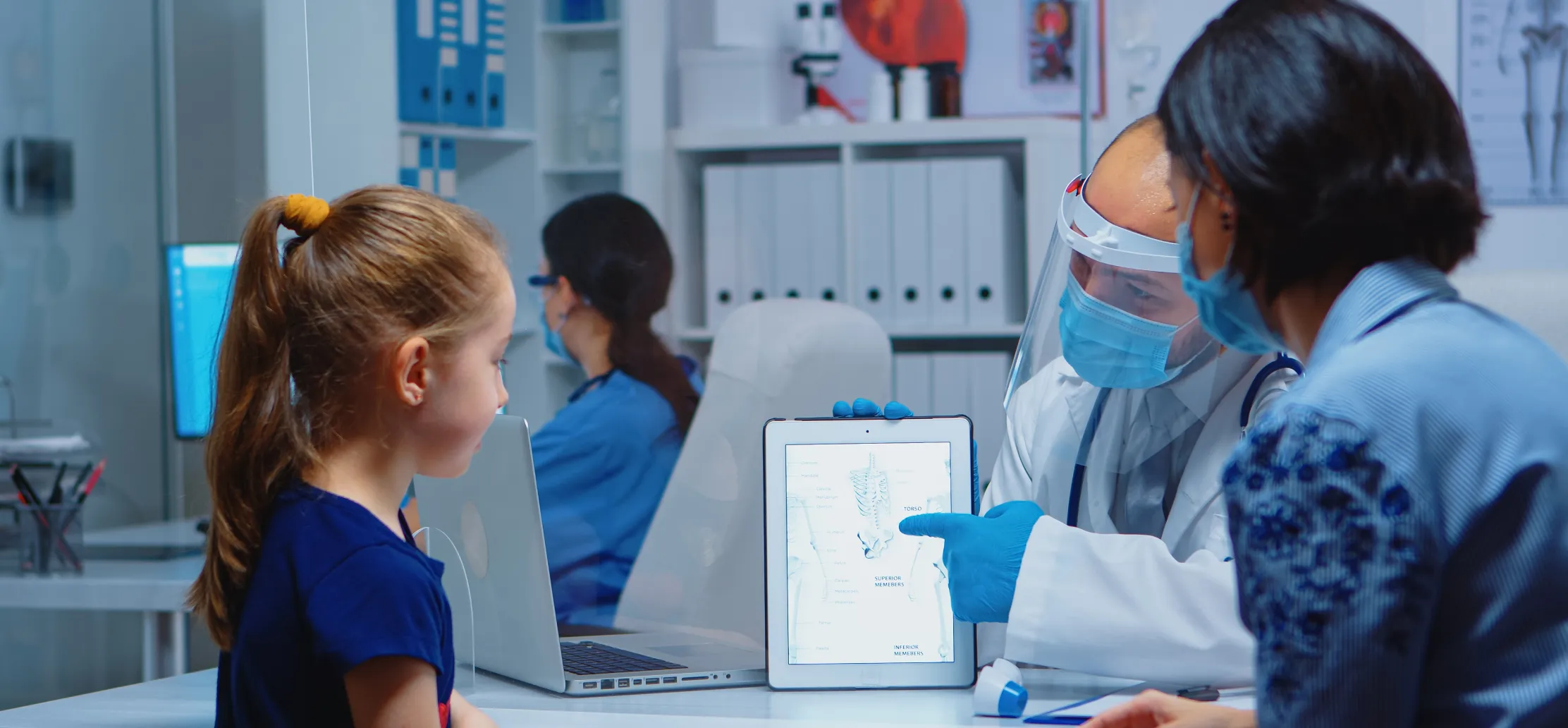
Machine learning, a branch of artificial intelligence that allows systems to learn from data and improve over time without explicit programming, is revolutionizing various fields. It’s making a big impact everywhere, from tech companies improving their software to banks predicting trends. And now, it’s also changing healthcare.
Machine learning for healthcare is pivotal in analyzing vast amounts of medical data with incredible precision.
In a field like healthcare where precision and timeliness are crucial, machine learning is proving to be a powerful tool. It analyzes vast amounts of medical data with remarkable accuracy and leverages sophisticated algorithms to detect patterns and insights that might be missed by the human eye.
This means doctors can now diagnose conditions with greater accuracy and speed.
Moreover, machine learning is not just about improving diagnostics—it's also enhancing how treatments are personalized.
With thousands of healthcare apps on platforms like the Play Store and hospitals developing their websites and applications, machine learning is helping create treatment plans tailored specifically to each individual’s health needs, based on thorough data analysis.
For example, IBM Watson Health is a global leader in this field, using machine learning to analyze medical data and provide personalized treatment recommendations, thus setting a new standard in precision healthcare.
So, as we dig in, get ready to see how machine learning is making a real difference in diagnosing health issues and creating personalized treatment plans. With all the exciting new developments and trends, the future of healthcare is full of amazing possibilities.
The Role of Machine Learning in Improving Diagnostic Accuracy:
Machine learning models are revolutionizing how we approach diagnostics in healthcare by significantly enhancing accuracy. These models process and analyze massive amounts of medical data, such as imaging and test results, with incredible precision.
For healthcare professionals, this means fewer missed diagnoses and more reliable results. By integrating machine learning applications, such as advanced imaging analysis and predictive algorithms, doctors can now identify conditions earlier and more accurately. This improvement in diagnostic accuracy is not just a technological advancement—it’s a critical step towards better patient outcomes and more effective treatments.
Surprisingly, machine learning is transforming healthcare diagnostics. Recent reports state that AI in medical diagnostics is expected to hit $3.8 billion by 2027, growing at an impressive 34.5% annually.
This rapid growth means that about 60% of hospitals in developed countries are already using these tools to boost diagnostic accuracy.
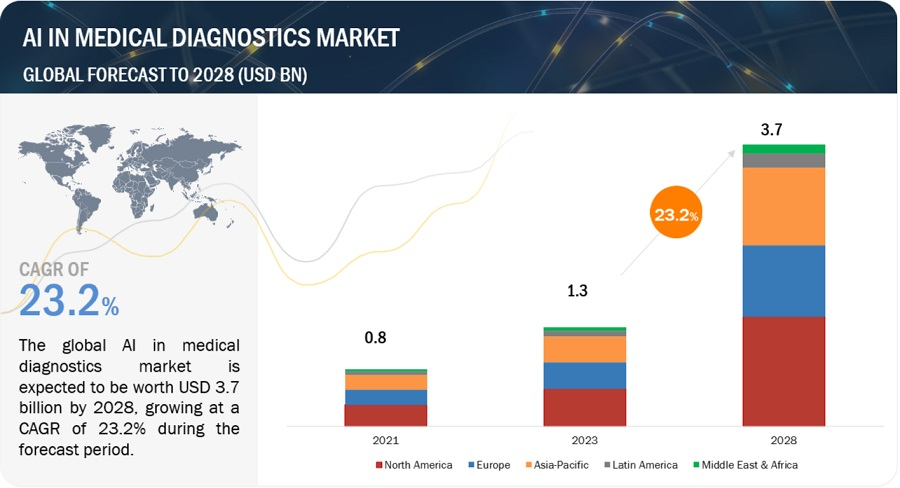
Even with advancements in technology, diagnostic accuracy in healthcare still faces several hurdles. While machine learning is helping to address these issues, it's important to understand the challenges that persist.
Here’s a closer look at the common diagnostic challenges that healthcare professionals encounter:
- Mistakes can occur due to fatigue, oversight, or misinterpretation of data by humans
- Many conditions have overlapping symptoms, making accurate diagnosis difficult
- Managing and interpreting vast amounts of medical data can be overwhelming
- Variations in test procedures and equipment can lead to inconsistent results
- Not all facilities have access to the latest diagnostic tools and technology
Despite the persistent challenges in diagnostic accuracy, machine learning is stepping in with innovative solutions to enhance precision and efficiency.
Here’s how machine learning models are making a difference in overcoming these obstacles:
1. Addressing human error:
Machine learning in healthcare helps mitigate human error by providing consistent and accurate analyses of medical data. These models are trained to recognize patterns and anomalies in imaging and other diagnostic tools, reducing the chances of oversight and improving overall diagnostic accuracy.
2. Simplifying Disease Complexity:
The complexity of diseases can often blur symptoms and make accurate diagnosis challenging. Machine learning applications tackle this issue by analyzing vast amounts of data, including medical imaging and genetic information, to identify subtle patterns that may indicate specific conditions. This leads to more precise and timely diagnoses.
3. Managing Data Overload:
Machine learning models excel at processing and analyzing large datasets, helping healthcare professionals make sense of complex information and extract actionable insights. This is particularly useful in managing EMR/EHR software for healthcare, where integrating and analyzing patient data is crucial.
4. Standardizing Testing Procedures:
Variations in diagnostic procedures can lead to inconsistent results. Machine learning for healthcare helps standardize testing by providing a consistent analysis framework. This helps ensure that diagnostic processes are uniform across different facilities, improving reliability.
5. Expanding Access to Advanced Technology:
Not all healthcare facilities have access to the latest diagnostic tools. Machine learning models are being integrated into various healthcare software development projects, including generative AI in healthcare, to bring advanced diagnostic capabilities to a broader range of facilities.
6. Reducing Bias in Data:
Machine learning models are designed to minimize biases in data interpretation. By using diverse datasets and continually refining algorithms, these models help ensure that diagnostic results are fair and representative of all patient demographics.
For example, consider the case of Google Health's DeepMind, which has developed a machine-learning model that has made significant strides in analyzing medical images. This model is particularly renowned for its ability to detect diabetic retinopathy and age-related macular degeneration from retinal scans.
Here’s how it works:

As AI technology continues to advance, its role in diagnostics is set to become even more integral, offering promising solutions for complex medical challenges.
Looking To Create A Healthcare System That Fits Your Needs Perfectly?
Our team can build a solution using the latest AI and ML tech just for you.
Machine Learning and the Future of Personalized Treatment
Personalized treatment plans are increasingly becoming a cornerstone of modern healthcare, offering patients tailored approaches that align closely with their individual health needs. The concept of personalized medicine aims to optimize treatment efficacy by considering unique patient characteristics, such as genetics, lifestyle, and health history.
However, creating and managing these tailored plans can be challenging for healthcare professionals. With an ever-expanding array of data, from detailed medical histories to complex genetic information, maintaining accurate and actionable treatment plans can feel like navigating through endless spreadsheets.
This is where machine learning models come in, delivering breakthrough solutions for generating and managing individualized treatment plans.
- Machine learning models process vast amounts of patient data—such as genetic profiles, medical records, and lifestyle factors—to create a detailed picture of each patient’s health. This allows for the development of highly personalized treatment plans based on a thorough understanding of individual needs.
- Machine learning can analyse historical data and identify patterns to predict how different treatments are likely to affect individual patients. This predictive capability helps in selecting the most effective treatment options tailored to each patient's specific condition and response.
- Machine learning models continuously learn and adapt as new data becomes available. This means that treatment plans can be updated in real time to reflect the latest information and research, ensuring that patients receive the most current and effective care.
- Instead of sifting through endless spreadsheets, healthcare professionals can use machine learning tools to streamline data management. These models can integrate and analyze data from various sources, making it easier to track patient progress and adjust treatment plans as needed.
When it comes to managing chronic conditions like diabetes, having a treatment plan that’s tailored specifically to your needs can make all the difference.
One standout example of how machine learning is revolutionizing personalized care is Livongo, a health-tech company that’s making diabetes management simpler to track.
Livongo uses AI and machine learning to analyze real-time data from patients, such as their blood sugar levels, diet, and physical activity. By identifying unique patterns in each patient’s data, Livongo can provide personalized health recommendations, like adjusting diet or medication.
This approach helps patients manage their condition more effectively, leading to better health outcomes.
Livongo's success shows how AI-driven personalized care can make a significant impact on patient health.
The skyrocketing growth of AI in the precision medicine market—from $2.14 billion in 2023 to a staggering $19.6 billion by 2033—proves that personalized healthcare is the future.
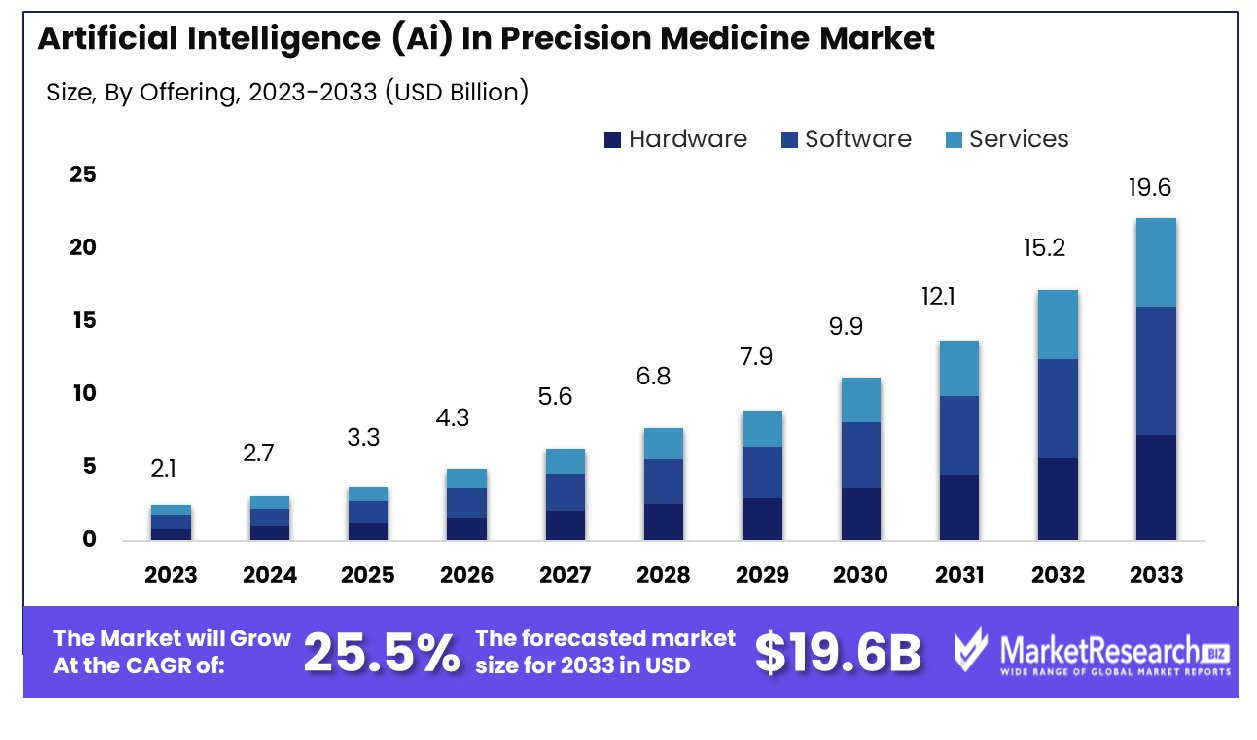
Want to be part of this transformation?
Let’s turn your innovative ideas into reality!
Integration with Existing Healthcare Systems
Over the years, healthcare has evolved significantly with the advent of new technologies and systems. As medical practices have become more sophisticated, so too have the tools and technologies designed to support them.
What started with simple record-keeping has now transformed into a network of advanced systems and software that streamline patient care and improve operational efficiency.
Today, healthcare facilities are equipped with a variety of advanced tools, each designed to handle different aspects of patient care and medical management.
These include:
- Electronic Health Records (EHR): These digital records keep track of a patient’s medical history, making it easier for doctors to access and manage information.
- Clinical Decision Support Systems (CDSS): These tools help doctors by offering recommendations and alerts based on their data, which helps make better decisions.
- Medical Imaging Systems: Technologies like MRIs, CT scans, and X-rays provide detailed images of the body, aiding in the diagnosis and monitoring of medical conditions.
- Telemedicine Platforms: These allow patients to consult with doctors remotely, making healthcare more accessible, especially for those who can’t visit a healthcare facility in person.
- Health Information Exchange (HIE): HIE systems enable different healthcare providers to share patient data, ensuring that everyone has access to the same information.
Healthcare technology is evolving rapidly, and integrating machine learning models with existing systems like Electronic Health Records (EHR) is a significant advancement.
Here’s how this integration works and why it’s so important:
1. Smooth Data Flow:
Machine learning in healthcare can handle and analyze vast amounts of data quickly. When these machine learning models are integrated with EHR systems, patient data is updated and analyzed in real time. This is a key part of healthcare Software development and improves the efficiency of managing patient information.
2. Predictive Insights and support:
Machine learning for healthcare can identify patterns in patient records that might not be immediately obvious. By connecting these models to EHR systems, doctors receive predictions about potential health issues before they escalate. This kind of Generative AI in healthcare provides early warnings and actionable insights, enhancing the quality of care.
3. Personalized Patient Information:
With machine learning applications, EHR systems can deliver more customized insights for each patient. These models analyze data like medical history and lifestyle to suggest personalized treatment plans. This highlights the benefits of Machine learning in making healthcare more individualized and effective.
4. Automated Data Handling:
Machine learning can automate routine tasks such as data entry and sorting, reducing manual effort and minimizing errors. For those looking to enhance their systems, ML Development Services can help seamlessly integrate these features with existing EMR/EHR software.
5. Better security and compliance:
When machine learning is applied to EHR systems, it also boosts data security. Models can detect unusual activities and potential security risks, helping maintain data integrity and compliance with healthcare regulations.
Challenges and Solutions in Integrating Machine Learning with Healthcare Systems
As we integrate machine learning models with healthcare systems, we encounter several challenges. Fortunately, technology itself offers solutions to these hurdles.
Here’s a look at common issues and how they can be addressed:
Challenge | Description | Solution | Best Practices |
| Data Privacy | Protecting patient information from unauthorized access while ensuring compliance with regulations like GDPR and HIPAA. | Use encryption and secure data storage solutions to safeguard patient data. Employ robust access controls and regular audits. | Implement end-to-end encryption, secure APIs, and conduct frequent security assessments. |
| Interoperability | Ensuring that different healthcare systems and EHR software can communicate and share data effectively. | Adopt standardized data formats and protocols to facilitate seamless data exchange. Develop integration frameworks for diverse systems. | Utilize interoperability standards such as HL7 FHIR and integrate with existing EMR/EHR software. |
| High-Quality Data | Machine learning models require accurate, comprehensive, and well-organized data to make reliable predictions. | Implement data cleaning and validation processes to improve data quality. Use AI-driven tools for data preprocessing and analysis. | Regularly update and validate datasets, and use automated tools to detect and correct data inconsistencies. |
By addressing these challenges with the right approach, healthcare organizations can truly make the most of machine learning applications. Technologies like Generative AI in healthcare and advanced Healthcare Software Development are key to overcoming these issues and ensuring that machine learning models work effectively.
Struggling With Healthcare Integration Challenges?
Partner with us to ensure a seamless integration of machine learning into your systems.
The Ethics of AI in Healthcare: Balancing Innovation and Privacy
As machine learning in healthcare makes strides, AI systems are being trained on extensive human data to keep them up-to-date and accurate. This constant learning helps these models get better at predicting and personalizing care.
But it also brings up big questions about data privacy and ethical use.
While machine learning models can offer incredible benefits, they can also introduce biases if they're trained on incomplete or skewed data. This can lead to unfair treatment recommendations and impact patient care. It's crucial that we address these issues to make sure that the benefits of machine learning for healthcare are realized without compromising fairness.
For example, consider the controversy over AI in healthcare, where a 2019 study found that some AI models showed racial bias in their recommendations.
This was a wake-up call, showing that if machine learning applications aren't carefully monitored, they can reinforce existing disparities.
Timnit Gebru, a well-known AI ethics researcher, wisely said,
“AI systems are only as good as the data they’re trained on. If that data is flawed, the system’s outputs will be flawed too.”
This quote drives home the need for careful attention to the quality and fairness of data used in Healthcare Software Solutions.
But ethical issues and data privacy don't just stop at the technology itself—they also involve how we handle patient data and comply with regulations.
Data Privacy is a cornerstone of using patient information in machine learning.
When healthcare organizations integrate machine learning models, they handle a vast amount of sensitive patient data, including personal health records, test results, and treatment histories. Ensuring this data is secure and used responsibly is not just about following the law—it's about maintaining trust with patients.
- Robust security measures like encryption, secure access controls, and regular security audits are crucial to protecting patient data.
- Healthcare providers need clear policies and procedures for data usage and sharing to maintain security.
- It's essential to ensure that machine learning models and Healthcare Software Development processes comply with legal standards and ethical guidelines.
- Patients should be informed about the purpose of data collection, how it will be protected, and their rights regarding their personal information.
The Crucial Role of Regulatory Compliance:
Regulations like the General Data Protection Regulation (GDPR) in Europe and the Health Insurance Portability and Accountability Act (HIPAA) in the U.S. set strict guidelines for handling personal data. These regulations ensure that patient information is secure and that any data used for machine learning applications adheres to legal and ethical standards.
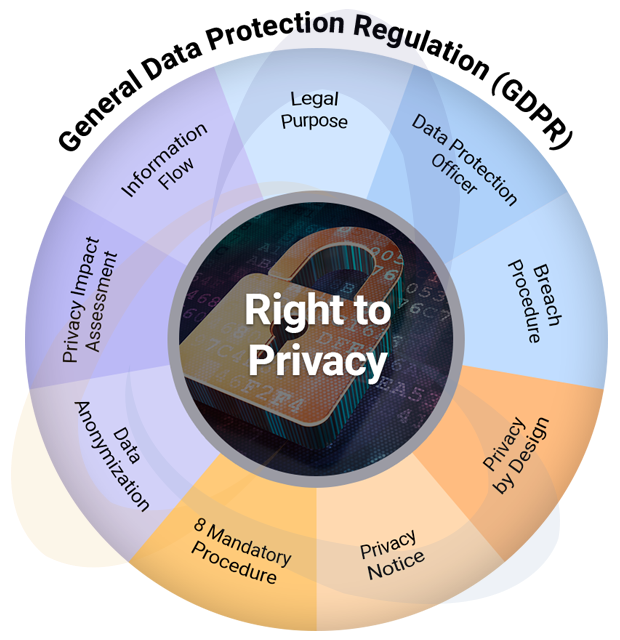
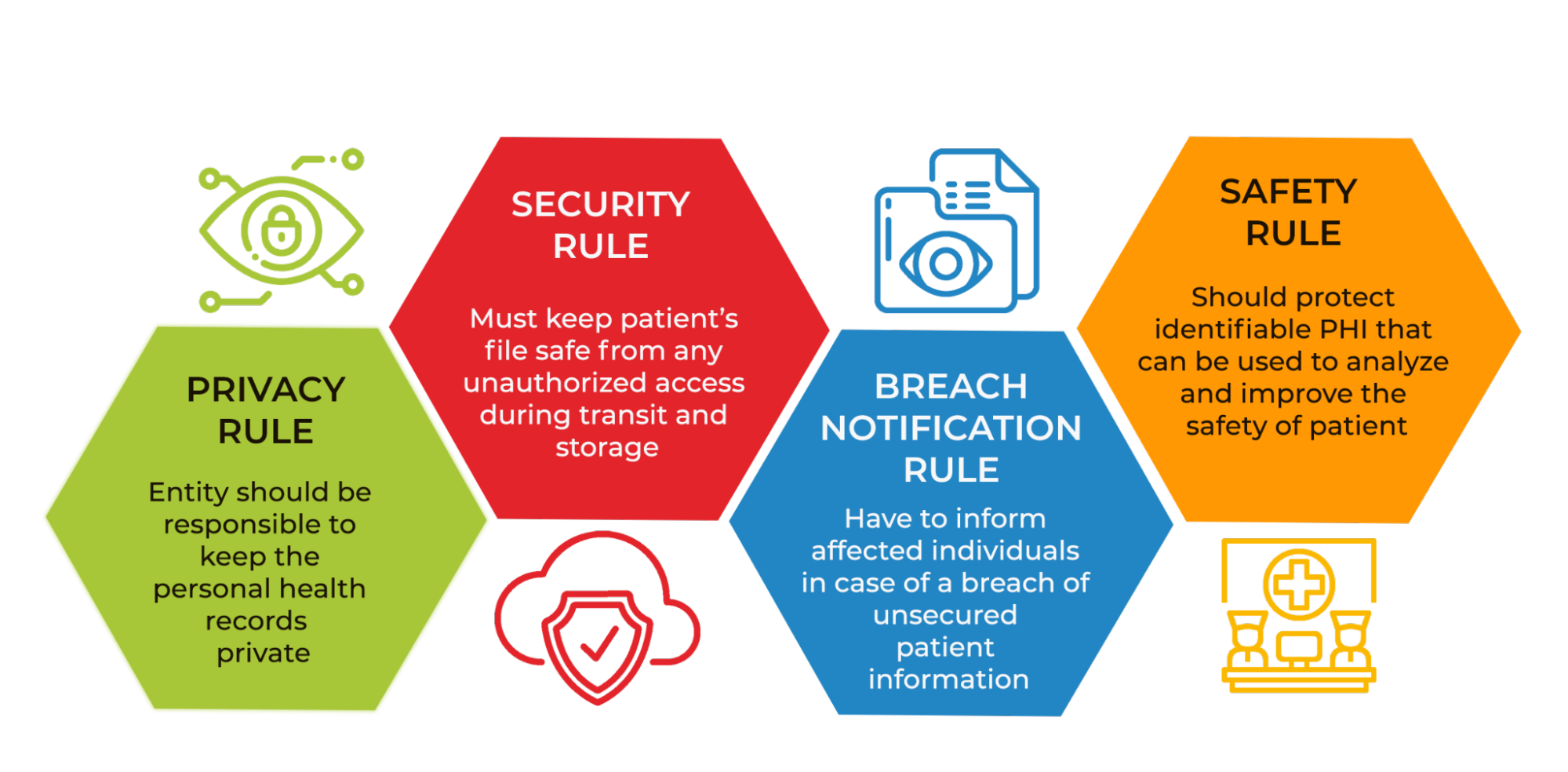
By following these rules, healthcare organizations can safeguard patient data and maintain compliance, ensuring that technology benefits everyone without compromising privacy.
What’s Next for Healthcare: Exciting Innovations Ahead
Machine learning in healthcare is moving at lightning speed, bringing us closer to what once seemed like science fiction.
Among these, real-time monitoring and advanced predictive models are leading the charge. Real-time monitoring, for instance, allows healthcare providers to continuously track patients’ vital signs and health metrics, enabling early detection of potential issues before they become critical. This proactive approach not only enhances patient outcomes but also reduces the burden on healthcare systems.
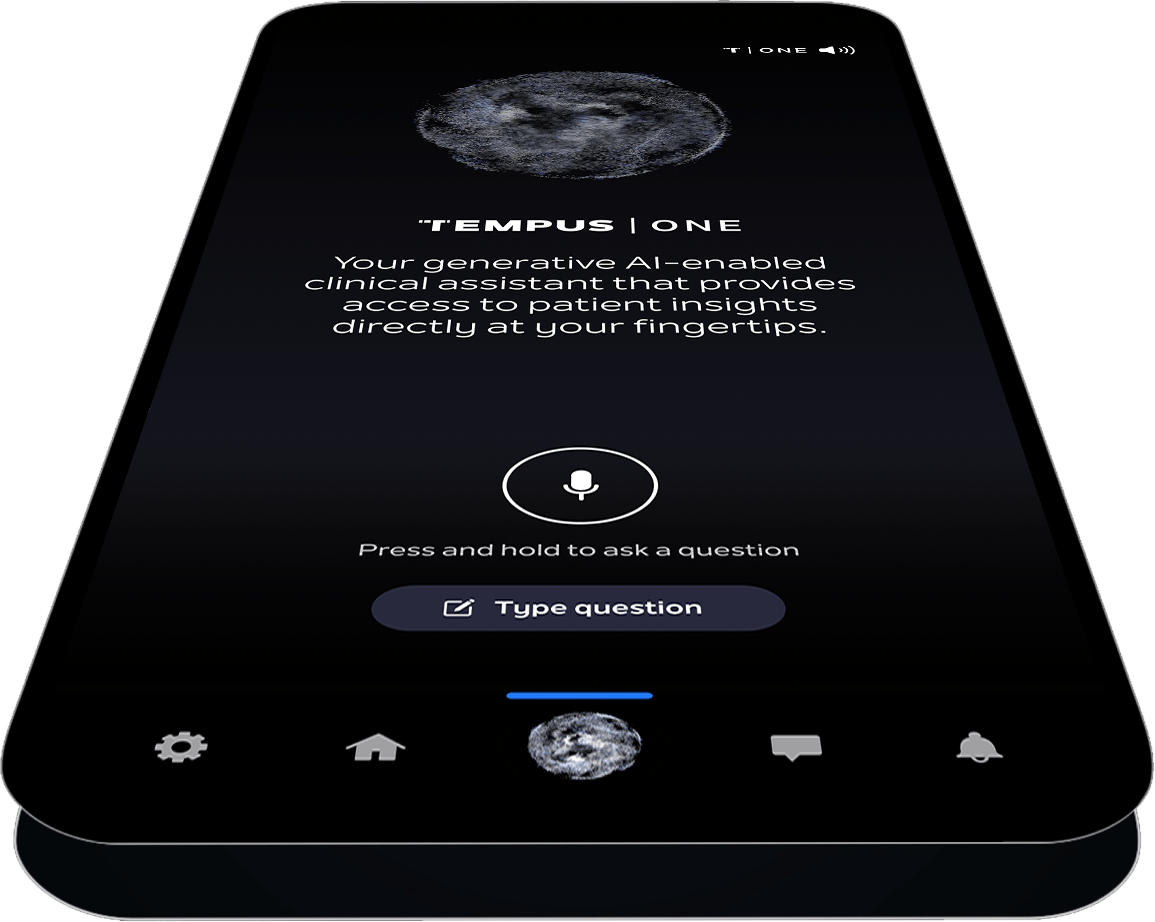
A prime example of this innovation in action is Tempus, a technology company that has been making significant strides in using AI to deliver real-time, data-driven insights for personalized cancer treatment.
By combining vast amounts of clinical and molecular data, Tempus helps doctors tailor treatments to each patient’s unique profile.
Their work shows just how powerful machine learning can be in making personalized medicine a reality.
According to a recent McKinsey study, Gen AI has the potential to revolutionize healthcare by significantly enhancing clinician productivity, improving patient and member engagement, and increasing administrative efficiency.
The study highlights that Gen AI could fundamentally improve patient experience and streamline healthcare operations, extending its impact beyond clinical applications to overall patient care interactions.
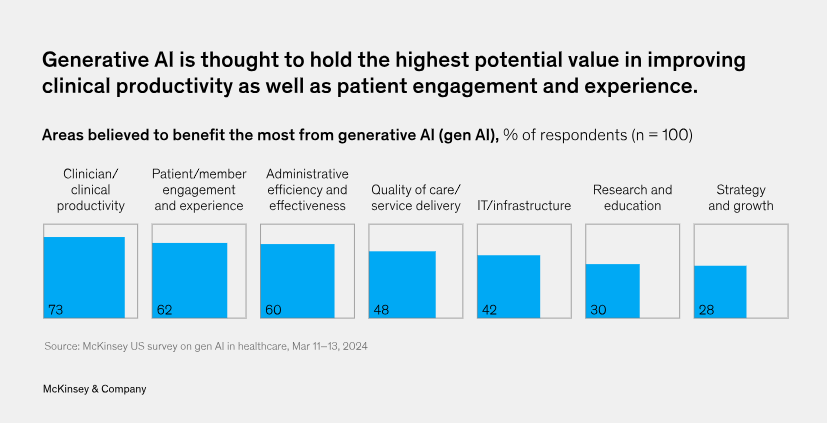
These innovations are driving us toward a healthcare system that is not only responsive but anticipatory—one where machine learning for healthcare and Generative AI play a central role in delivering personalized, proactive care.
TRooTech's Software Development Services and ML Development Services would help you to integrate Machine Learning Models with EMR/EHR Software for Healthcare.
Build The Future Of Healthcare With Expert ML Solutions
We would be our partner in Healthcare AI
Long Story Short
As we wrap up our exploration of AI and machine learning in healthcare, it’s clear that this topic is as dynamic as the technologies themselves. With continuous advancements in AI and healthcare, the possibilities are endless, and the future looks exceptionally bright when these two fields converge.
For instance, recent studies have shown that Machine learning models are already enhancing diagnostic accuracy by up to 20% and are instrumental in developing personalized treatment plans that adapt to individual patient needs.
This ongoing innovation helps in early disease detection, more accurate diagnoses, and tailored treatment strategies that improve patient outcomes.
However, as we forge ahead, it’s crucial to remember the importance of addressing ethical considerations and maintaining high standards of data privacy. Ensuring that technology is used responsibly and ethically will safeguard patient trust and maximize the benefits of machine-learning applications.
At TRooTech Business Solutions, we’re excited about these advancements and ready to help you integrate the latest technology into your systems or create custom solutions just for you. Whether you want to upgrade your current setup or launch a new product, our team of experts in machine learning and healthcare software development is here to guide you.
Reach out today to see how we can help you stay at the forefront of healthcare innovation!
FAQs
Machine learning in healthcare typically includes supervised learning, unsupervised learning, and reinforcement learning. Each type helps with different tasks, such as diagnosing diseases, identifying patterns in medical data, and optimizing treatment plans.
Machine learning models analyze medical images and patient data to detect diseases more accurately and earlier, reducing false positives and improving diagnosis reliability.
Machine learning can automate data entry, enhance patient record management, and provide predictive analytics, Creating an EMR Software more efficient and supportive in decision-making.
Hiring developers with machine learning expertise helps in creating advanced healthcare solutions, improving diagnostics, personalizing treatments, and streamlining operations tailored to your needs.
Machine learning speeds up drug discovery by analyzing large datasets to find potential drug candidates and predict their effectiveness, and it also helps in repurposing existing drugs and optimizing clinical trials.
Machine learning tailors treatment plans to individual patients by analyzing their health data and historical outcomes, ensuring treatments are customized for better effectiveness.
Ethical considerations are key to maintaining trust and ensuring fairness. Addressing issues like bias and data privacy ensures machine learning applications are used responsibly and effectively.

